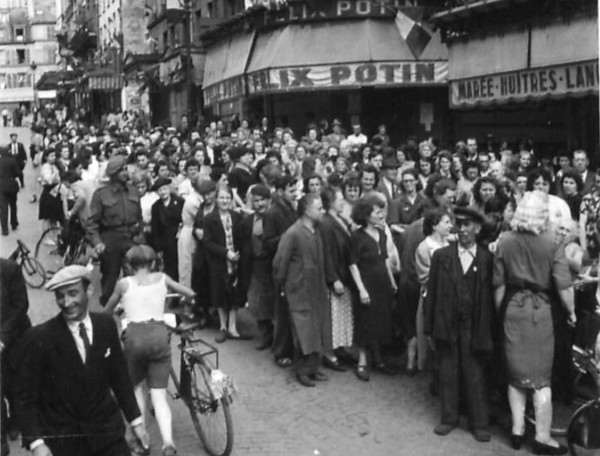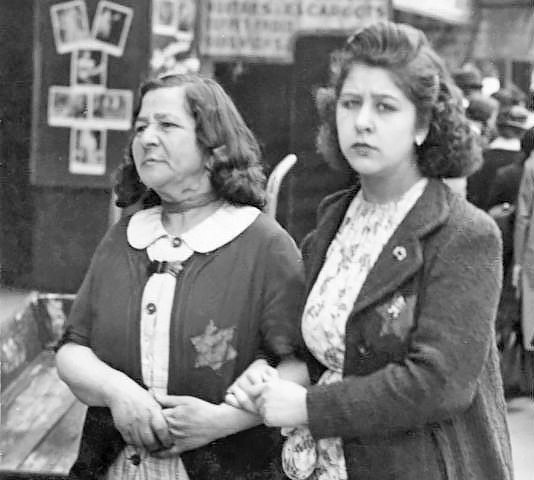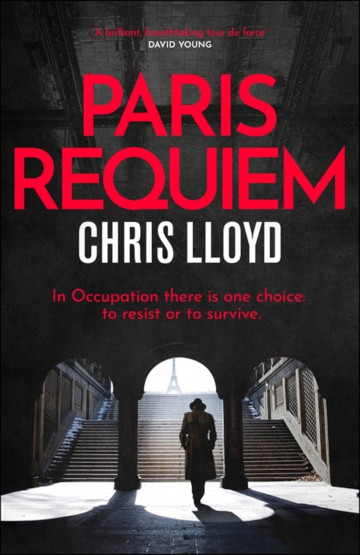
After the fall of France, the occupying Nazi regime began to bleed the country dry through blatant financial exploitation. Parisians found even the most basic foodstuffs hard to get, largely because of the activities of the notorious bureaux d’achats. Chris Lloyd, author of Paris Requiem, explains what happened.
“Ils nous prennent tout.”
As Parisians queued for anything up to five hours for their monthly ration tickets, and then another two or three hours on top of that outside their allotted butcher’s, baker’s or grocer’s to buy what meagre food was on offer, “Ils nous prennent tout” – “They’re taking everything we have” – was a heartfelt imprecation that would often run up and down the hungry, resentful line.
Yet, however mournful the complaints of the people, the lack of basic essentials they faced on a daily basis was just the tip of the iceberg of how much the Occupiers really were taking the French for everything they had.
The “Ils” were the Germans: the soldiers and bureaucrats of the Nazi machine who had occupied Paris in June 1940 and immediately set about despoiling the city and the people for all they were worth.
Not forgetting all the chancers who had followed in the army’s wake. I’m not talking here of the atrocities carried out during the Occupation, the murders and executions, the hostages and roundups. This is about the financial exploitation the Nazis put in place to bleed France dry and the measures they used to enforce it.
One of the stipulations of the 1940 armistice, when Hitler rubbed French noses in the dirt by accepting their defeat in the same railway carriage as had been used in 1918 to accept Germany’s surrender, was that huge swathes of French agricultural and industrial production were to be sent to Germany.
All of it was bought at a vast profit, not solely because the Occupiers set the terms, but because the rules put in place by which those terms had to abide were already heavily stacked against French producers.
Not least of these was another armistice condition whereby the French were forced to pay the costs accrued by the Germans in occupying the country – payback for the rancour felt by the Nazis at the terms of the Treaty of Versailles. The bill presented to the French for being occupied came to twenty million Reichsmarks a day.
As if that weren’t enough, the Occupiers also set their own exchange rate, which was obviously hugely favourable to their own interests. It was now one Reichsmark to twenty Francs as opposed to the figure of five or so Francs before the Occupation.
A set of guidelines drawn up by the Economic Administration of the military administration left little doubt as to the intent of these measures. In short, their avowed primary objective was to increase German war potential, which meant focusing on French firms that could fulfil that, even if it meant closing others, with the subsequent loss of jobs. By the autumn of 1940, unemployment in Paris stood at over 60,000.
The guidelines also required that French civilian consumption should be reduced to a minimum and that all Jewish businesses were to be closed. In short, despite Hitler’s claimed intent of making Paris the second city of the Reich, the purpose of France had become that of paying for the Nazis’ war effort, no matter the hardship that caused the French people.
Thanks to the exchange rate, the administration, soldiers and traders could buy everything up cheaply and ship it back to Germany. As an example of the imbalance, every German soldier was given 50 Reichsmarks spending money. That translated into 1,000 Francs. French woman whose husband had been taken prisoner of war and who had one child received an allowance of less than 30 Francs from the Vichy government.
As Parisians struggled to put food on the table, it was little wonder that the average German soldier was able to buy luxury goods and staples and send them home to their families, who were, in turn, suffering from rationing.
Yet this was still not the most scandalous of the cons being perpetrated. Rackets, both official and semi-official, were rife. Possibly the worst of these were the bureaux d’achats. These were central buying offices set up by various branches of the German civil and military authorities. Every institution, from the Kriegsmarine to the Luftwaffe, the Abwehr to the Gestapo, had their fingers in the pie. They proved to be so lucrative that there were eventually some 200 in all at their height.
The bureaux d’achats were able to access funds from the reparations paid to Germany by Vichy every week and buy whatever they could get their hands on at knockdown rates, thanks to the exchange rate and the prices they demanded of the French producers. The bureaux then either sold them to the German military or exported them back to Germany at exorbitant prices.
To add insult to injury, the military that had bought the goods with Vichy money, then billed the Vichy government for everything it had bought from the bureaux. This way, France effectively paid twice to supply its own produce to the Occupiers.
The most infamous of the bureaux d’achats was run by Hermann Brandl, an Abwehr officer who went under the name of Otto. Partly a cover for the Abwehr’s spying activities, it also provided the organisation with unofficial extra funding. Brandl and his staff would buy anything from medicines to office equipment, machinery to motor vehicles.
The only stipulation was that it should be in large enough quantities to turn a healthy profit. Neither were they overly worried about the provenance or true ownership of the goods they were buying.
Unsurprisingly, all of this under-the-counter activity brought the bureaux d’achats into contact with the Parisian gangs. Not as rivals, but as allies. The German agencies began by using French criminals as their enforcement arm, coercing reluctant sellers into accepting the terms on offer, but some of the gangs soon burgeoned into full-blown partners in crime and worse.
The most notorious of these was known as the Carlingue and was headed by a petty criminal who rose to dizzying heights of power and cruelty, and a disgraced police detective. Also known as the French Gestapo, the gang also included the captain of France’s football team at the 1930 World Cup and an Olympic gold medallist in discus, javelin and shot-put.
They initially worked with the Abwehr, but switched allegiance to the Gestapo, which not only allowed them to carry police ID, but armed them, awarding them unchallenged dominance. Over time, their role extended to hunting Jews and members of the Resistance. Like their masters, they reaped the benefits of the appallingly burdensome impositions placed on their fellow French people. Unlike their fellow French, they suffered none of the hardships of Occupation.
Paris Requiem by Chris Lloyd is published on 23 February, 2023. It’s the second book in his Eddie Giral series of noir crime novels set in Paris in the aftermath of the Nazi invasion. The first, The Unwanted Dead, won the 2021 HWA Gold Crown Award.
Read Historia’s exclusive extract from the beginning of Paris Requiem. Chris has also been interviewed by Historia.
You may also enjoy the feature he wrote about the background to his series, The French Resistance: shadier than you think.
Images:
- Parisians queue outside a bakery-patisserie: Ministry of Information Second World War Official Collection © IWM D 24161 (IWM Non-Commercial Licence)
- The Compiègne Wagon, June 1940: Wikimedia (public domain)
- Fish stall in a Parisian market with notices about tickets on display: Ministry of Information Second World War Official Collection © IWM D 24177 (IWM Non-Commercial Licence)
- Crowds queueing for food in Paris: Ministry of Information Second World War Official Collection Ministry of Information Second World War Official Collection © IWM B 9906 (IWM Non-Commercial Licence) (IWM Non-Commercial Licence)
- Two Jewish women in Paris wearing yellow stars: Das Bundesarchiv via Wikimedia (CC BY-SA 3.0 DE)









